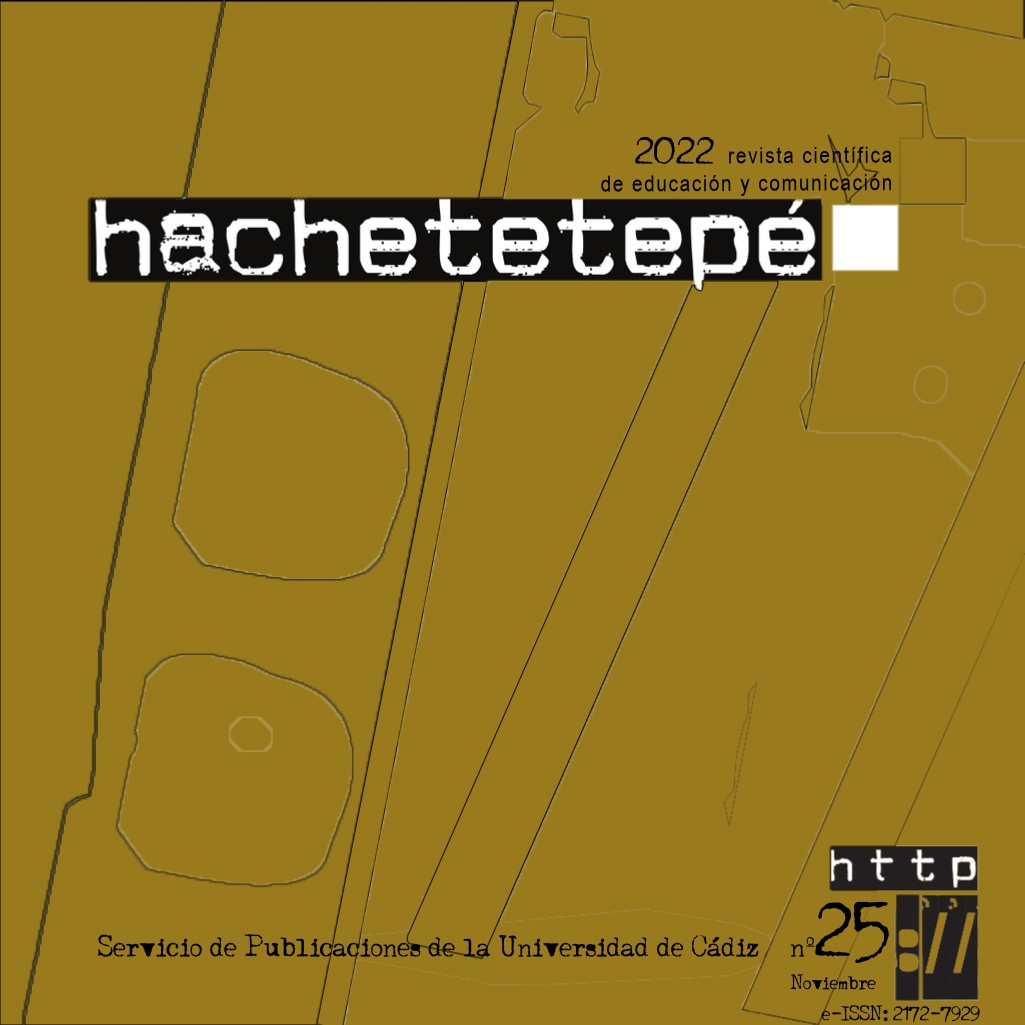Approach to the beliefs of chilean teachers about usging audiovisual resources

Downloads
- PDF (Español (España)) 341
- EPUB (Español (España)) 70
- VISOR (Español (España))
- MÓVIL (Español (España))
- XML (Español (España)) 16
DOI
https://doi.org/10.25267/Hachetetepe.2022.i25.2203Info
Abstract
Chilean language and literary teachers have adopted audiovisual resources in their teaching to promote the development of reading and literary competence of their students, despite the fact that the educational programs by MINEDUC do not consider them. The goal of this research is to analyze and describe the beliefs system of four Chilean teachers using audiovisual resources in literary classes. The main data collection of data was the semi-structured interview. They were ortographically transcribed and categorized by a thematic analysis around five topics. The main results show that the use of audiovisual resources has a positive reception by students of a certain age, mainly because they motivate them. However, some technological deficiences are seen as barriers for its implementation in the classroom, as well as insufficient pedagogical training in the area of methodologyKeywords
Downloads
Supporting Agencies
How to Cite
License
Copyright (c) 2022 Constanza Suazo Muñoz, Alba Ambrós-Pallarés

This work is licensed under a Creative Commons Attribution-NonCommercial-NoDerivatives 4.0 International License.
Those authors who have published with this journal, accept the following terms:
- They will retain their copyright and guarantee the journal the right to first publication of their work, which will simultaneously be subject to the Creative Commons Attribution License . They may be copied, used, disseminated, transmitted and publicly displayed, provided that the authorship, url, and magazine are cited, and are not used for commercial purposes. No derivative works are allowed.
- They may adopt other non-exclusive license agreements for the distribution of the published version of the work (e.g., deposit it in an institutional telematic archive or publish it in a monographic volume) provided that the initial publication in this journal is indicated.
- Disseminate your work through the Internet (e.g., in institutional telematic archives or on your website) once the manuscript is accepted, which may lead to interesting exchanges and increased citations of the published work. (See The effect of open access).
Hachetetepé. Scientific journal of education and communication does not charge a fee for the submission of manuscripts or for the publication of its articles.
References
Ambrós, A., y Breu, R. (2007). Cine y educación. El cine en el aula de Primaria y Secundaria. Graó.
Barkhuizen, G. (2011). Narrative Knowledging in TESOL. TESOL Quarterly, 45(3), 391- 414. https://doi.org/10.5054/tq.2011.261888
Braun, V., y Clarke, V. (2006). Using thematic analysis in psychology. Qualitative Research in Psychology, 3(2), 77-101. https://doi.org/10.1191/1478088706qp063oa
Borg, S. (2006). Teacher Cognition and Language Education. Continuum.
Boyatzis, R. (1998). Transforming qualitative information: thematic analysis and code development. Sage.
Cambra, M. (2000). El pensament del professor: formació per a la pràctica reflexiva. En A. Camps, I. Ríos y M. Cambra (Eds.), Recerca i formació en didàctica de la llengua (pp.161-172). Graó.
Cambra, M. y Fons, M. (2006). Interacción en el aula de acogida. En A. Camps (Coord.) Diálogo e investigación en las aulas (pp.243-262). Graó.
Cambra, M. y Palou, J. (2007). Creencias, representaciones y saberes de los profesores de lenguas en las nuevas situaciones plurilingües escolares de Cataluña. Cultura y Educación, 19(2), 149-163. https://doi.org/10.1174/113564007780961651
Dorio, I., Sabariego, M. y Massot., I. (2009). Características generales de la metodología cualitativa. En R. Bisquerra (Coord.), Metodología de la investigación educativa. Capítulo 9 (pp. 275-292). La Muralla.
Dufva, H. (2003). Beliefs in dialogue: Bakhtinian view. En AM. Barcelos y P. Kalaja (Eds.), New approaches to research on beliefs about SLA (pp.131-151). Kluwer Publishers.
Fives, H. y Buehl, M. (2012). Spring cleaning for the messy construct of teachers’ beliefs: What are they? Which have been examined? What can they tell us? En K.R Harris, S. Graham y T. Urdan (Eds.), APA Educational Psychology Handbook. Vol 2.
Individual differences and cultural and contextual factors (pp.471-499). https://doi.org/10.1037/13274-019
Gabillon, Z. (2012). Revisiting foreign language teacher beliefs. International Online Language Conference 2012, 3, 190-203. https://bit.ly/39T0iGQ
Jover, G. (2022). Leer a los clásicos en la escuela. El Diario de la Educación. https://bit.ly/3On8sX8
Lucca, I. y Berríos, R. (2009). La investigación cualitativa: fundamentos, diseños y estrategias. Ediciones SM.
Mieles, M., Tonon, G., y Alvarado, S. (2012). Investigación cualitativa: el análisis temático para el tratamiento de la información desde el enfoque de la fenomenología social. Universitas Humanística, (74), 195-225.
MINEDUC. (2015). Bases Curriculares 7° básico a 2° medio. https://bit.ly/3bt28yT
MINEDUC. (2019). Bases Curriculares 3° y 4° medio. https://bit.ly/3nnBWbj
Palou, J. (2008). L’ensenyament i l’aprenentatge del català com a primera llengua a l’escola. Creences i actuacions dels mestres amb relació a les activitats de llengua oral a l’etapa de primària. Institut d’Estudis Catalans.
Pérez, M. (2016). Estudi longitudinal de les creences sobre l’alfabetització inicial de tres estudiants del Grau d’ Educació Infantil de la Universitat de Barcelona. [Tesis doctoral]. Universidad de Barcelona.
Sabariego, M. (2009). La investigación educativa: génesis, evolución y características. En R. Bisquerra (Coord.), Metodología de la investigación educativa (pp, 51-87). La Muralla.
Schutz, A. (1973). Collected papers i: the problem of social reality. The Hague, the Netherlands. Martinus Nijhoff.
Skott, J. (2009). Contextualising the notion of belief enactment. Journal of Mathematics Teacher Education, 12(1), 27-46. https://doi.org/10.1007/s10857-008-9093-9
Skott, J. (2015). The promises, problems, and prospects of research on teachers’ beliefs. In H. Fives y M. G. Gill (Eds.), International Handbook of research on teachers’ beliefs (pp. 13-30). Routledge.
Suazo, C., y Ambrós, A. (2022). Investigación exploratoria del uso de recursos audiovisuales para el desarrollo de la competencia lecto-literaria en las aulas chilenas. En A. Lopes, F. Hernández, J. M. Sancho, y J. I. Rivas (Eds.), Multimodalidad
y Didáctica de las Literaturas. Graó. (En prensa).
Tuckett, A.G. (2005). Applying thematic analysis theory to practice: a researcher’s experience. Contemporary Nurse, 19, 75-87.
Woods, D. (1996). Teacher Cognition in Language Teaching. Beliefs, Decision-Making and Classroom Practice. Cambridge University Press.






